

7 Places Where Can ESA Go: Rights and Access Explained
by Lena Park
Last updated: July 29, 2025
Verified and Approved by:
Angela Morris,
MSW, LCSW
Fact Checked

Overview
This article highlights the rights and access of Emotional Support Animals (ESAs), focusing on the significant role they play in the lives of their handlers. Many individuals facing mental health challenges often struggle with feelings of isolation and anxiety. ESAs can provide comfort and companionship, helping to alleviate these emotional burdens.
However, it is essential to understand where these beloved animals can accompany their handlers. ESAs are protected under laws such as the Fair Housing Act and the Air Carrier Access Act, which grant them access to housing and travel accommodations. Yet, it is important to note that their rights in public spaces are more limited compared to those of service animals.
This limitation can be disheartening for many, as the presence of an ESA can make a profound difference in one’s daily life. If you or someone you know is navigating these challenges, consider the supportive solution of obtaining an ESA letter, which can help ensure that your emotional support animal is recognized and accommodated in various settings.
Remember, you are not alone in this journey, and there are resources available to help you find the support you need.
Introduction
Navigating the world of Emotional Support Animals (ESAs) can feel both empowering and overwhelming, particularly for those seeking comfort and companionship during mental health challenges. With the right documentation, ESAs provide profound emotional benefits, yet understanding where these animals can accompany their owners is essential. As laws evolve and awareness increases, many questions emerge:
- What rights do ESAs hold in housing, travel, and public spaces?
- How can individuals effectively advocate for their needs?
This article explores the rights and access of ESAs, offering clarity and guidance for those looking to enhance their emotional well-being through these cherished companions.
Wellness Wag: Quick Access to Emotional Support Animal Letters
At Wellness Wag, we understand the emotional challenges many individuals face due to mental health issues. The journey can often feel overwhelming, and finding the right support is crucial. That’s why we provide a streamlined process for obtaining Emotional Support Animal (ESA) letters, which also addresses the question of where can ESA go, starting with a brief assessment to determine eligibility. After this, clients have the opportunity to consult with licensed physicians who genuinely care about their needs and offer valuable guidance.
Once approved, clients receive their official ESA letter within 24 hours, providing timely support when it’s needed most and answering the question of where can ESA go. This swift access is vital for those requiring prompt emotional assistance, especially for individuals dealing with housing limitations or travel difficulties stemming from their mental health struggles. Research shows that 88% of ESA owners report a positive mental health impact from having an ESA, while 74% of pet owners experience improved mental well-being thanks to their beloved pets. These statistics underscore the profound emotional benefits that ESAs can provide.
Moreover, acquiring ESA letters promptly can alleviate stress and empower individuals to advocate for their rights under the Fair Housing Act and Air Carrier Access Act, highlighting the issue of where can ESA go. Mental health experts emphasize that having the appropriate documentation enhances the effectiveness and validity of an ESA, allowing individuals to access essential accommodations with confidence.
At Wellness Wag, we also recognize that financial considerations can be a barrier, which is why we offer flexible payment plans starting at just $32.25, making our services more accessible. It’s important to remember that ESA letters must be renewed annually to maintain their validity and ensure continued access to the support you deserve. We’re here to help you every step of the way, providing the compassion and understanding you need on your journey to better mental health.
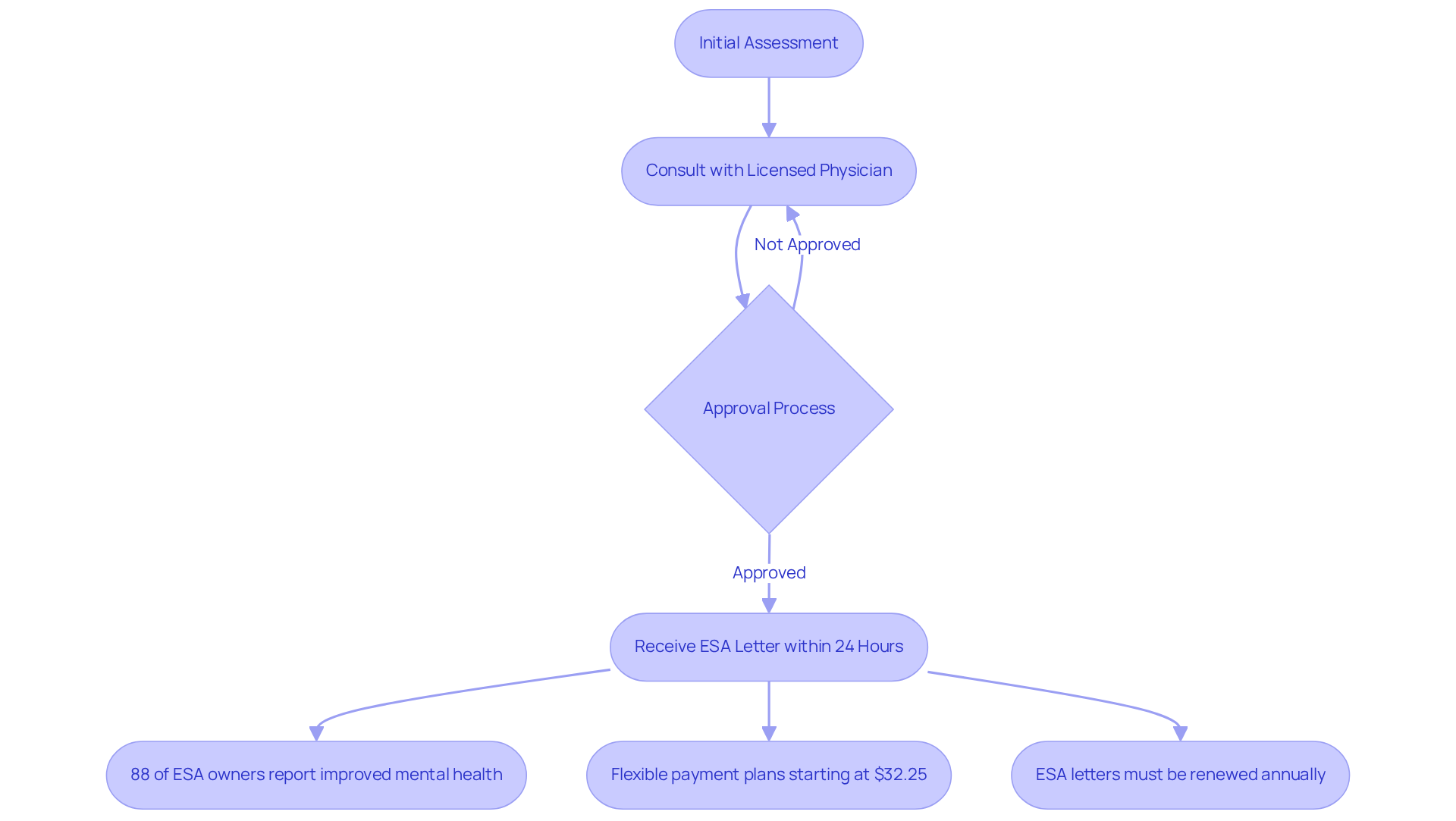
Fair Housing Act: Rights for Emotional Support Animals in Housing
The Fair Housing Act provides individuals with Emotional Support Animals specific rights, allowing them to live alongside their pets in housing that may otherwise restrict animals. This law is vital, as it ensures that landlords cannot deny housing based on a tenant’s need for an ESA, clarifying where can ESA go, provided they have the necessary documentation. It is essential for tenants to present their ESA letter, issued by a licensed mental health professional, to advocate effectively for their rights.
Many individuals face emotional challenges that make the companionship of an ESA crucial. Recent legal cases highlight the significance of these rights. For example, the U.S. Department of Justice has acted against landlords who unlawfully denied tenants their ESA requests, reinforcing the necessity for compliance with the FHA. Housing advocates emphasize that tenants who understand their rights and present appropriate documentation often succeed in securing housing for their emotional support animals.
Key provisions of the FHA require landlords to make reasonable accommodations for tenants, including considerations of where can ESA go. This may involve waiving no-pet policies and prohibiting additional pet fees. Such legal protections empower tenants to live with their emotional support animals, fostering a nurturing environment for those managing mental health challenges. As awareness of these rights increases, more tenants are successfully advocating for their ESA needs. This highlights the importance of effective communication between tenants and landlords in ensuring compliance with the law, reminding us that support is available for those who seek it.
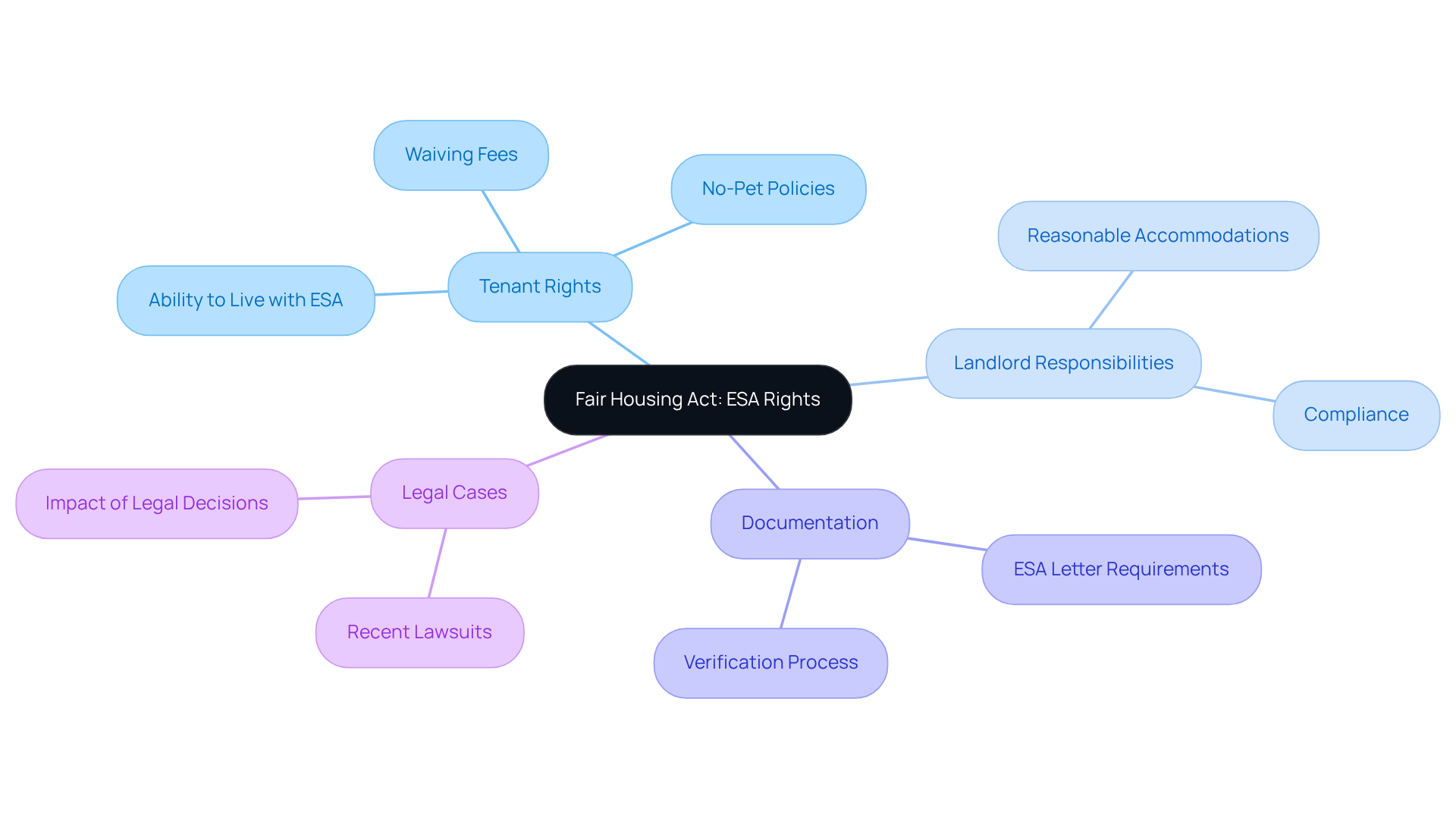
Air Carrier Access Act: Traveling with Your Emotional Support Animal
The Air Carrier Access Act provides a compassionate opportunity for individuals with Emotional Support Animals to travel with their beloved pets in the cabin of an aircraft. For many, the presence of an emotional support animal can significantly alleviate feelings of anxiety and loneliness during travel. Airlines are required to accommodate these animals, as long as passengers present the necessary documentation, including a valid letter.
It’s important to remember that checking with your airline in advance can help clarify specific requirements, ensuring that your journey is as smooth and stress-free as possible. By taking these steps, you can focus on the comfort and companionship your ESA brings, allowing you to navigate your travels with a sense of security and support.
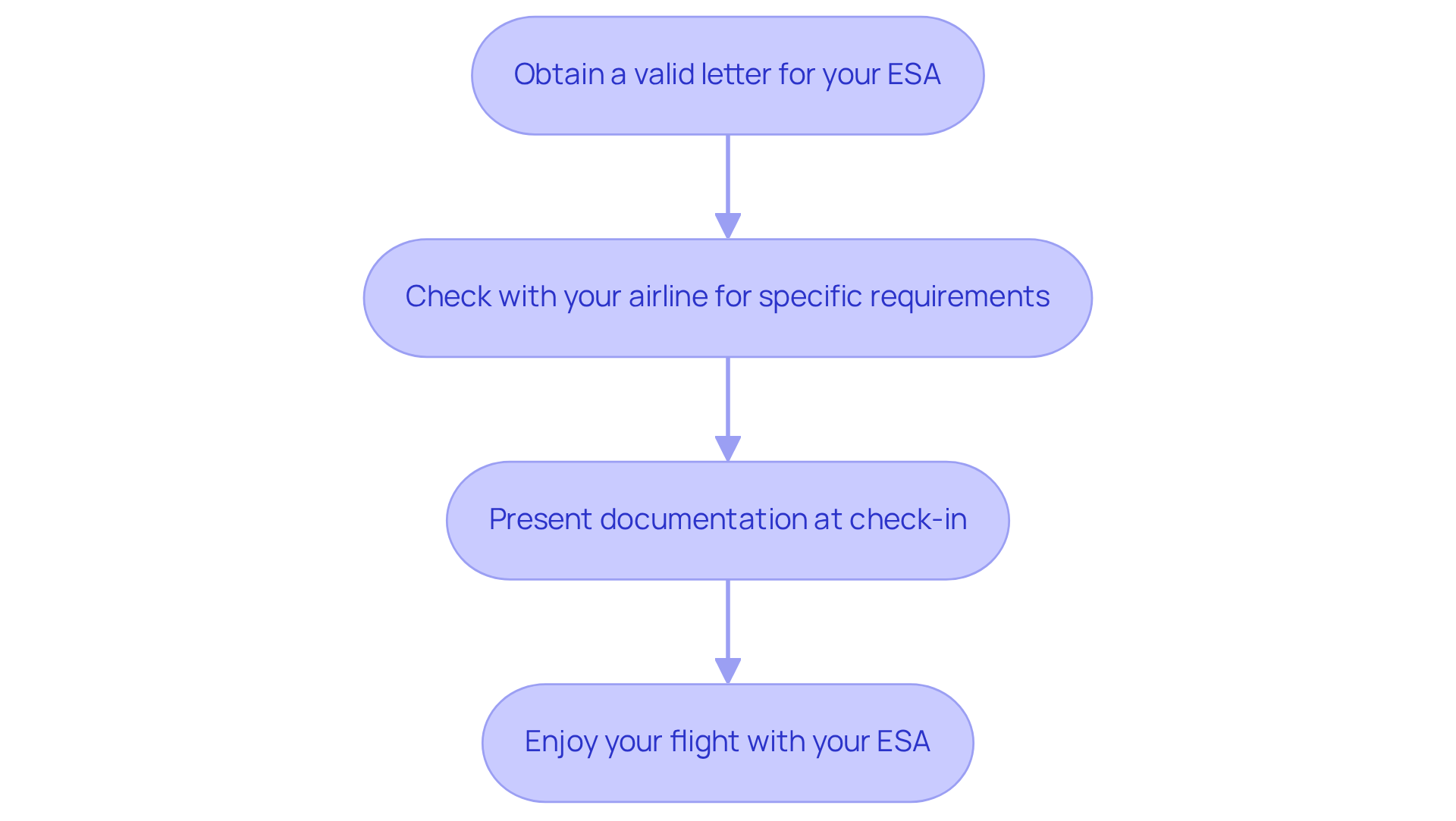
Public Spaces: Access Rights for Emotional Support Animals
While Emotional Support Animals (ESAs) have specific rights under housing and travel laws, their access to public spaces is more limited compared to service animals. Generally, emotional support animals are not granted the same access rights in public areas such as restaurants or stores. However, some establishments may choose to permit emotional support animals at their discretion. It’s essential for ESA owners to inquire about where can ESA go regarding policies before visiting public spaces, as this can help avoid any unexpected challenges.
Many individuals face emotional struggles, and the companionship of an ESA can provide significant comfort. Recent studies indicate that approximately 36% of Americans own pets, and those with secure attachments to their pets experience 25% lower anxiety levels than those without. This highlights the emotional benefits that pets can bring into our lives. Disability advocates emphasize the need for clearer guidelines, stating that “ESAs help people feel less lonely and more emotionally balanced.” Understanding these subtleties is vital for ESA owners to determine where can ESA go in order to fully benefit from the companionship their pets provide.
Additionally, it’s important to note that flexible payment plans starting at $32.25 are available through Wellness Wag, making ESA services more accessible. This compassionate option can help individuals who are seeking the emotional support that ESAs can offer, ensuring that they feel less alone in their journey toward emotional well-being.
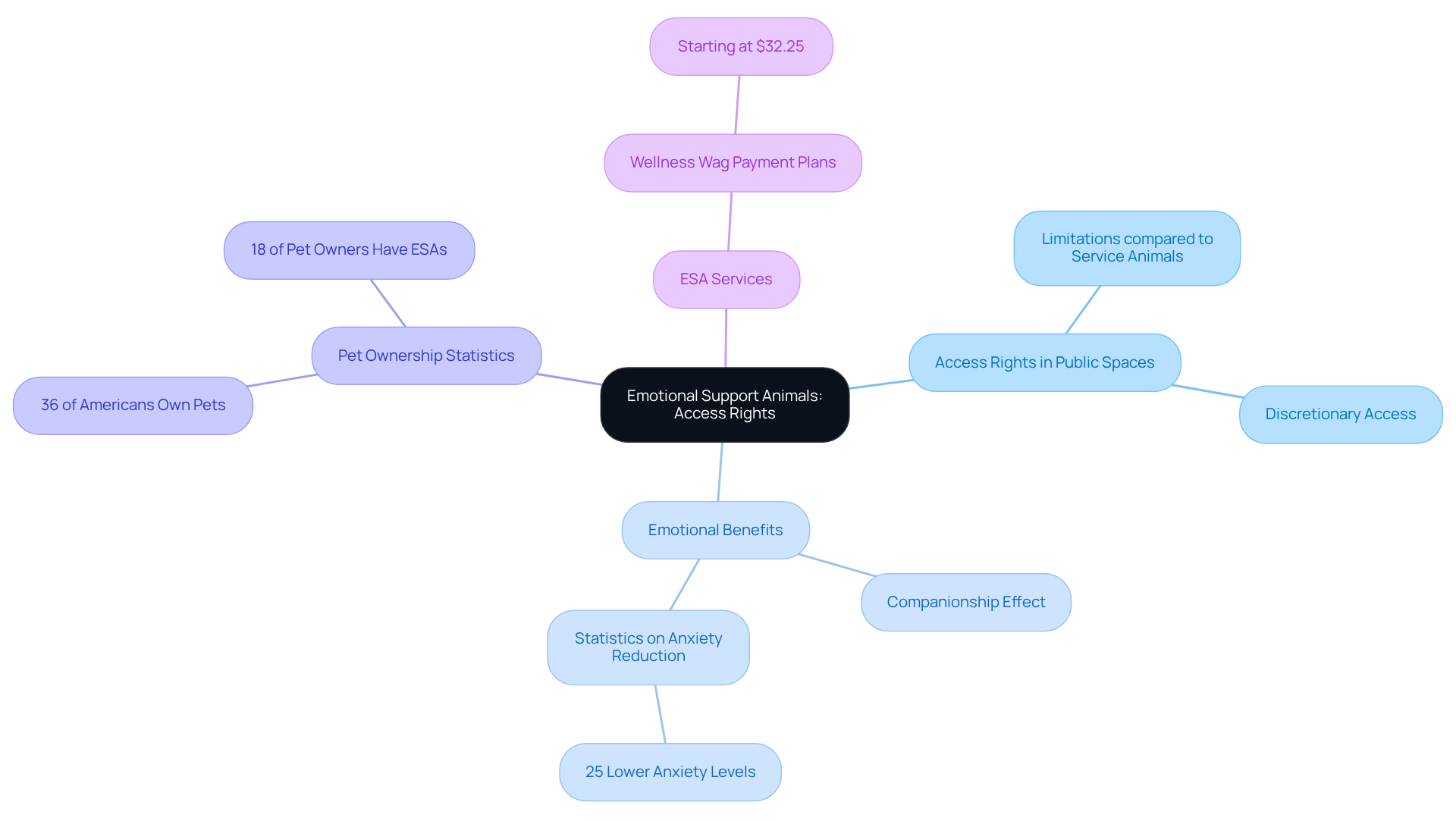
Service Animals vs. Emotional Support Animals: Key Differences
Assistance creatures are specifically trained to perform tasks for individuals with disabilities, such as guiding those who are visually impaired or alerting individuals with hearing impairments. These roles are invaluable, as they address significant challenges faced daily.
On the other hand, Emotional Support Animals offer comfort and emotional support, yet they are not trained to perform specific tasks. This important distinction affects the legal rights and access of each category of creature, especially in public spaces and housing. Understanding this can be crucial for those seeking support.
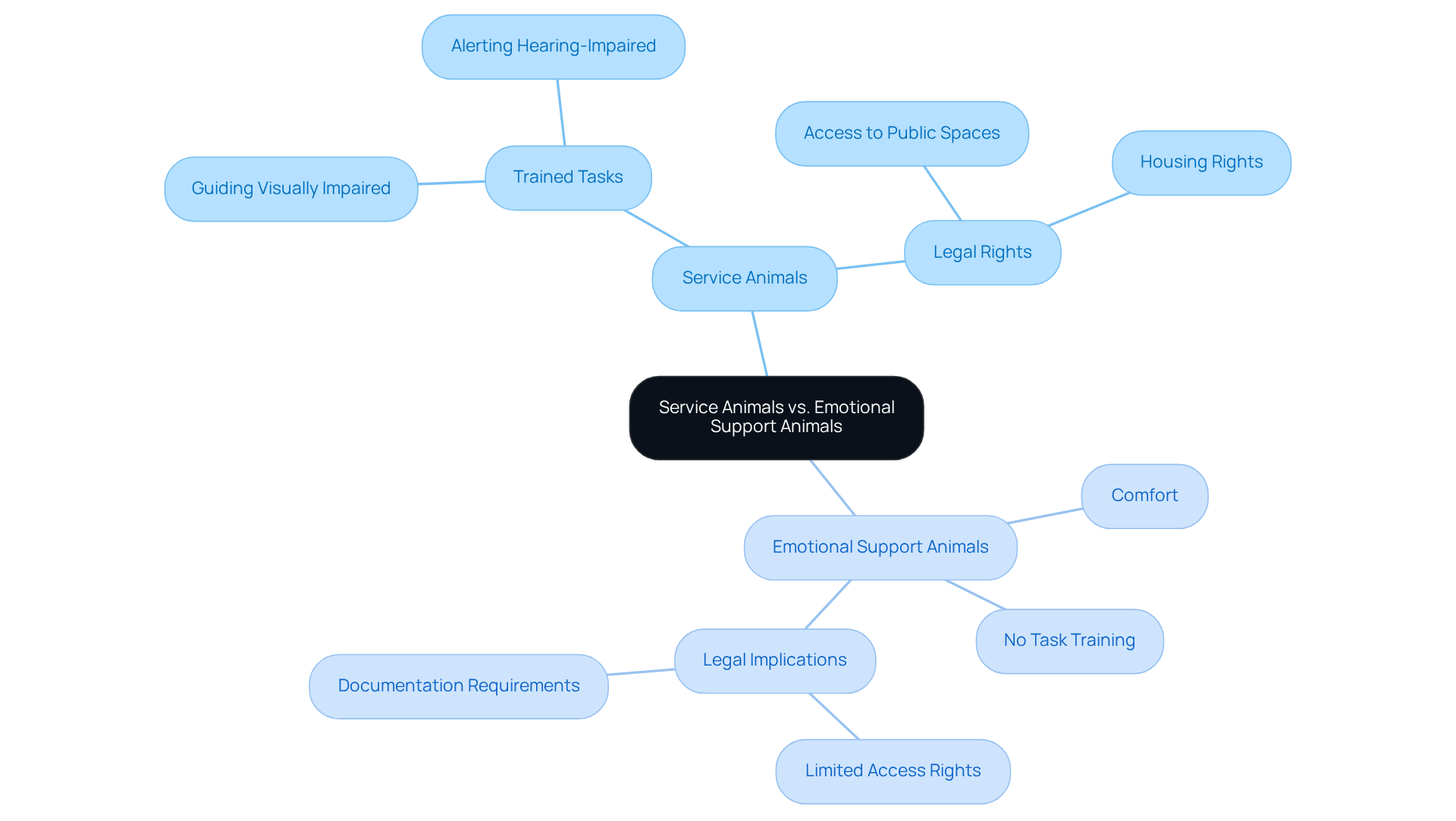
Housing Accommodations: Legal Protections for Emotional Support Animals
Navigating the complexities of mental health can be incredibly challenging, and for many, emotional support animals (ESAs) provide a vital source of comfort and companionship. Under the Fair Housing Act, there are important legal protections in place for these cherished companions. Landlords are required to make necessary adjustments for tenants with emotional support animals, which includes:
- Waiving pet fees
- Allowing pets in no-pet housing
This ensures that individuals can have their beloved ESAs by their side, fostering a sense of security and well-being.
To ensure compliance with these regulations and to advocate effectively for their rights, tenants must present their ESA letter to landlords. This letter serves as a crucial document, affirming the need for emotional support and helping to facilitate a smoother living experience. By understanding these protections, individuals can feel empowered, knowing that there is support available to help them navigate their housing situations with their emotional support animals.
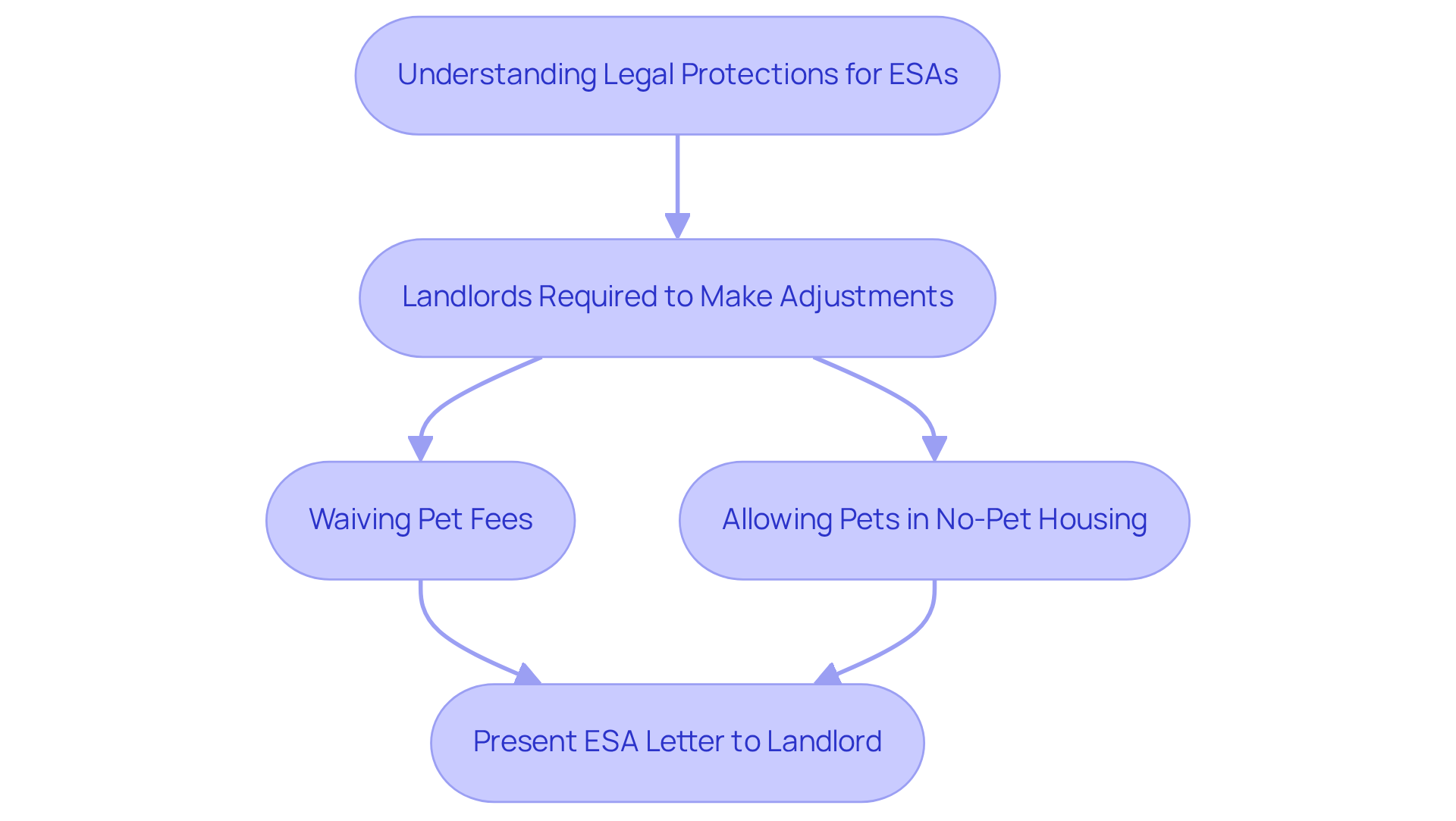
Employment Rights: Emotional Support Animals in the Workplace
While the Americans with Disabilities Act (ADA) does not classify Emotional Support Animals as service animals, an increasing number of employers are recognizing the potential benefits of allowing such support in the workplace. This can serve as a reasonable accommodation for employees facing mental health challenges, including anxiety, depression, and PTSD. It is essential for employees to communicate their needs effectively, articulating their requests clearly and providing valid documentation from licensed mental health professionals to support their case.
Recent trends indicate that some employers have adopted more flexible policies regarding emotional support animals, creating a nurturing environment that prioritizes the mental well-being of their staff. Companies that have embraced pet-friendly policies often report improvements in morale and productivity. Employers are encouraged to engage in open conversations with employees about their support animals, exploring how these companions can positively impact workplace dynamics while minimizing any operational disruptions.
To ease the accommodation process, employees should be ready to discuss where can ESA go in helping mitigate their mental health conditions and how it can harmoniously coexist with workplace responsibilities. Providing documentation that outlines the necessity of the ESA can significantly strengthen their request. It’s important to understand that employers are not legally obligated to accommodate ESAs, making acceptance a case-by-case matter. Additionally, while any type of animal can serve as an ESA, dogs are frequently preferred in office settings due to their trainability. By setting clear expectations for the animal’s behavior and care, employers can cultivate a supportive work environment that benefits both employees and the organization as a whole.
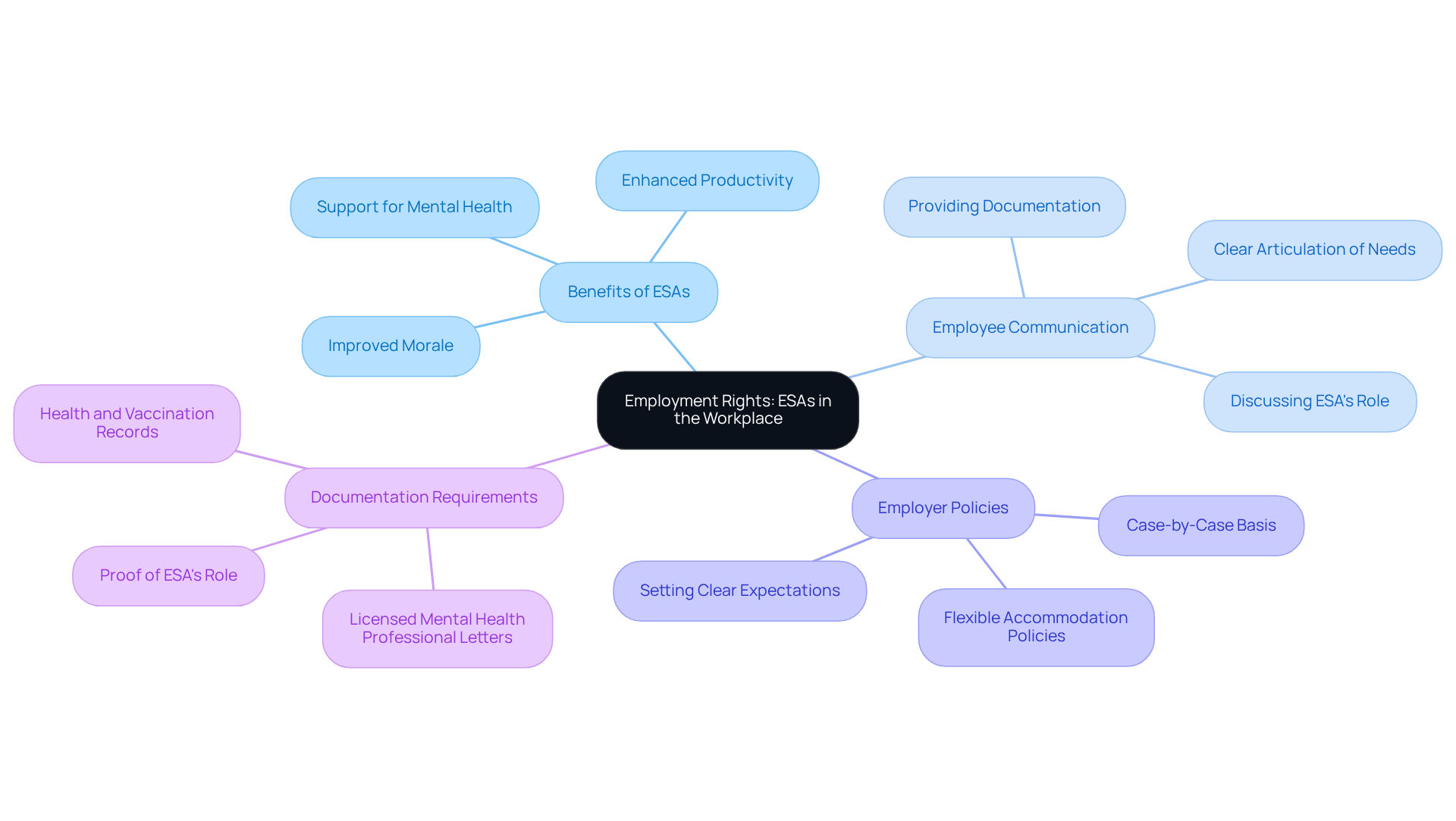
Handler Responsibilities: Caring for Your Emotional Support Animal
Handlers of Emotional Support Animals carry a heartfelt responsibility to ensure the well-being of their beloved pets. This not only involves providing proper care and training but also nurturing their socialization.
It’s essential for handlers to be attuned to their ESA’s needs, ensuring they are well-behaved in various public settings. By embracing responsible ownership, not only do we enrich the lives of these cherished companions, but we also enhance the experience for ourselves and those around us.
The bond we share with our ESAs is profound, and taking these steps fosters a deeper connection, creating a supportive environment for all.
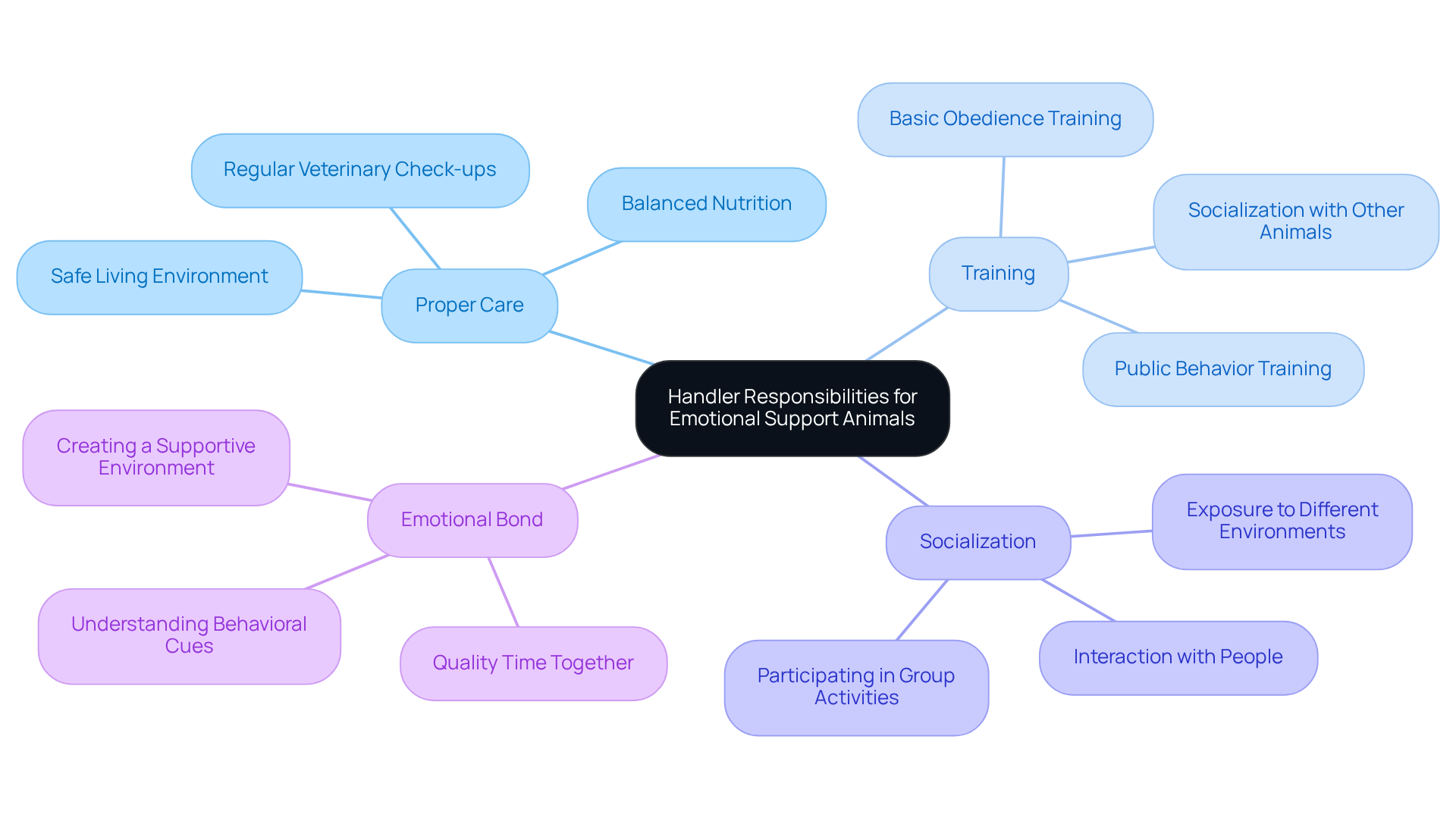
Common Misconceptions: What You Need to Know About Emotional Support Animals
Misunderstandings about Emotional Support Animals (ESAs) are all too common, particularly when it comes to comparing them with service animals. While service animals are specifically trained to assist individuals with disabilities, ESAs primarily offer comfort and emotional support without the need for specialized training. This distinction is crucial, as many people mistakenly believe that ESAs share the same rights and access as service animals, leading to confusion about their presence in public spaces.
Statistics reveal that a significant portion of the public is unclear about these differences. For instance, a survey indicated that nearly 30% of pet owners do not recognize the distinct functions of ESAs compared to service animals. Moreover, 26% of pet owners expressed a desire to have their pets registered for emotional or financial reasons, highlighting the importance of understanding ESA registration. This lack of clarity can result in misrepresentations, where individuals may falsely claim their pets as service animals to gain access to places where pets are typically prohibited.
Real-life examples further illustrate these misconceptions. A recent discussion highlighted instances where individuals misrepresented their ESAs as service animals to avoid fees or restrictions, causing frustration for those who genuinely rely on trained service dogs for assistance. Mental health experts emphasize that while ESAs can provide significant emotional benefits, they do not possess the same legal rights as service animals under the Americans with Disabilities Act (ADA). Alisha Eskay poignantly noted, “One of the advantages of owning a pet or spending considerable time with living beings is enhancing mental well-being,” underscoring the emotional support that these animals can provide.
To qualify as an ESA, a pet must be prescribed by a licensed mental health professional, ensuring that the pet’s presence is deemed essential for the individual’s emotional health. This requirement underscores the importance of understanding the legitimate roles of emotional support animals and the need for proper documentation to validate their presence in various settings. Notably, a survey found that 91% of respondents with emotional support animals reported relief from anxiety, and 62% of ESA owners experienced improved mental health during the pandemic, further emphasizing the vital role ESAs play in mental health support.
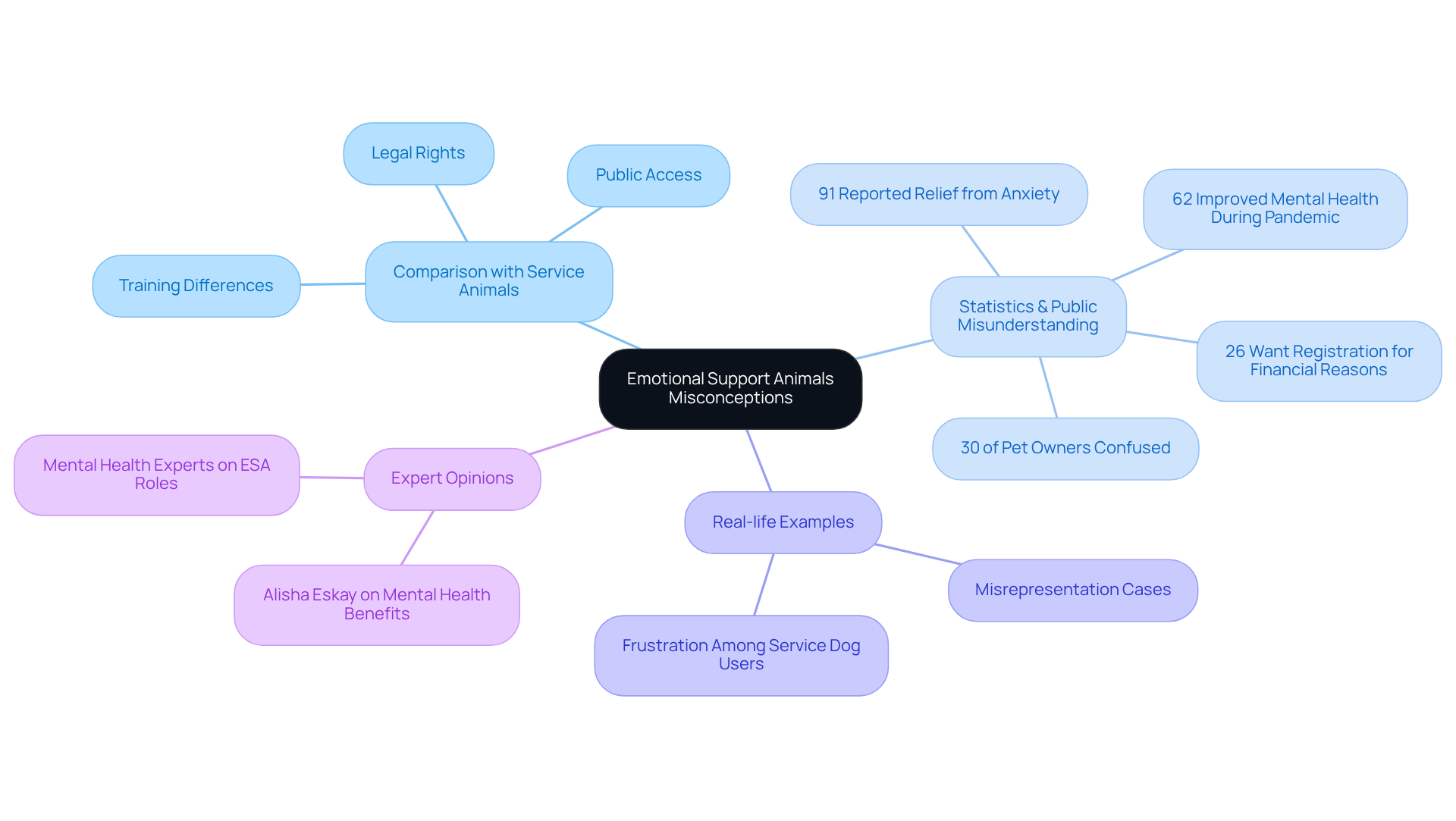
Resources for Obtaining Your Emotional Support Animal Letter
For individuals grappling with mental health challenges, the journey can feel overwhelming. The emotional toll can leave one feeling isolated and unsupported. Thankfully, there are resources available, such as Emotional Support Animal (ESA) letters, which can help determine where can esa go for a comforting solution. Online platforms like Wellness Wag have emerged as leaders in this space, offering a compassionate and streamlined process. Through a brief assessment and consultation with licensed professionals, clients can obtain valid ESA letters that meet legal requirements, ensuring they receive the support they deserve. With over 50,000 patients successfully assisted, Wellness Wag demonstrates its commitment to connecting individuals with the emotional support they need.
In addition to online resources, mental health organizations and local therapists play a crucial role in guiding individuals through the ESA letter process and advising them on where can esa go. They empower clients to understand their rights and responsibilities regarding ESAs, including questions about where can esa go, which are protected under the Fair Housing Act and the Air Carrier Access Act. A representative from ESA Pet expressed, “Our mission is to provide people with the resources to ensure their safety and safeguard their rights.” With nearly 26% of American adults facing a diagnosable mental disorder each year, the need for emotional support animals is more pressing than ever, making these resources indispensable.
Many success stories highlight the positive impact of acquiring an ESA letter. Clients often share how this documentation has fostered a sense of security and support in their housing situations. One client remarked, “The process was straightforward, and I felt relieved knowing I had the support I needed.” This blend of accessible online services and professional guidance helps individuals navigate the complexities of ESA letters with confidence and ease. Furthermore, Wellness Wag offers flexible payment plans starting at just $32.25, ensuring that these vital services are within reach for a wider audience.
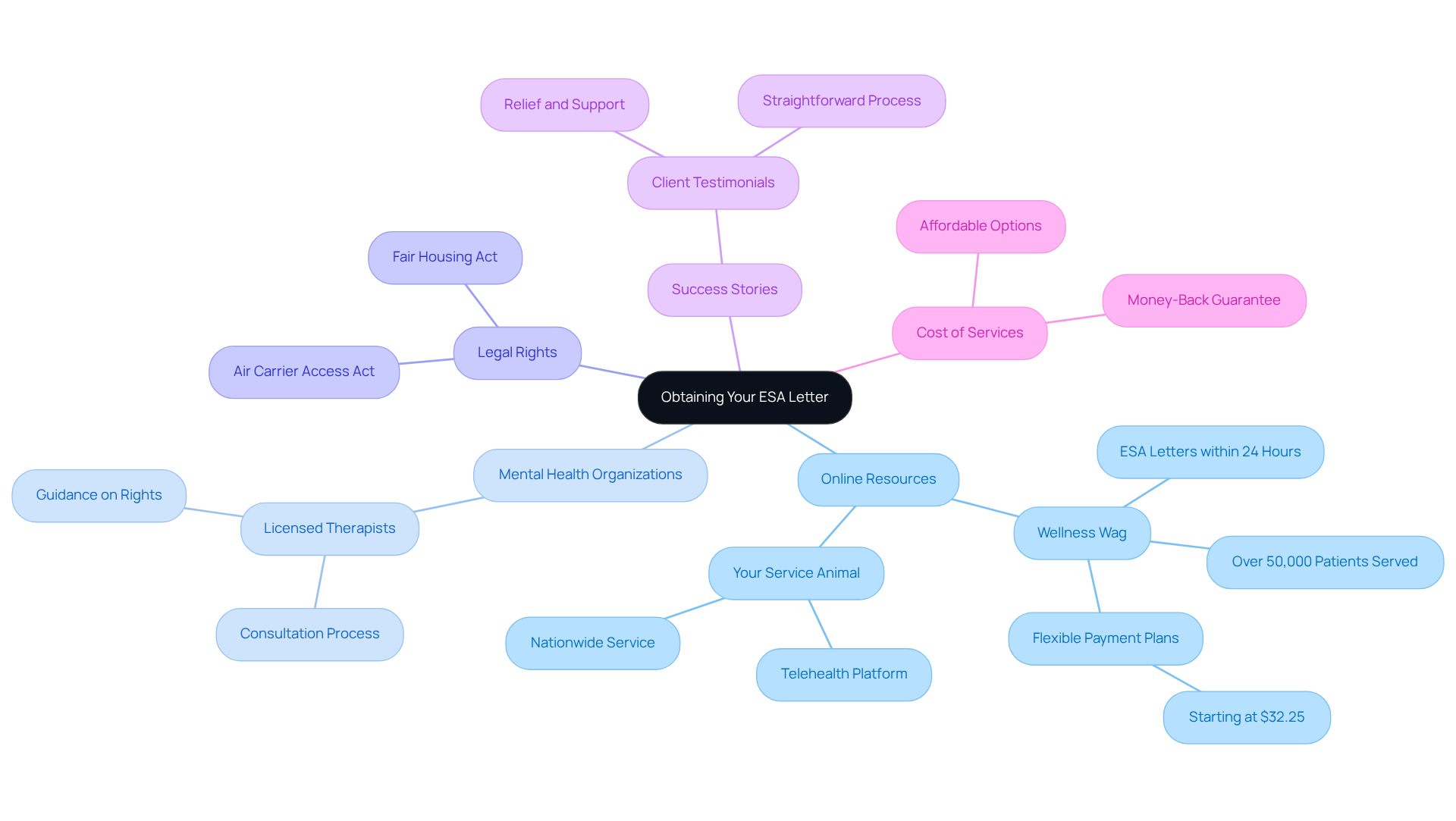
Conclusion
Understanding the rights and access of Emotional Support Animals (ESAs) is essential for individuals seeking emotional well-being through these beloved companions. Many individuals face emotional challenges that can feel overwhelming, and it’s crucial to recognize how ESAs can provide comfort and support during these times. This article has explored the various legal protections and support systems available, emphasizing the critical role that proper documentation plays in ensuring that ESAs can accompany their handlers in housing, travel, and potentially even workplaces.
Key insights include:
- The Fair Housing Act’s provisions that protect tenants’ rights to live with their ESAs.
- The Air Carrier Access Act’s regulations for traveling with emotional support animals.
- The distinctions between service animals and ESAs.
The importance of obtaining valid ESA letters cannot be overstated, as they serve as a vital resource for individuals navigating their rights. Moreover, understanding the responsibilities of handlers and the positive impact of ESAs on mental health is essential in fostering awareness and understanding of these rights and responsibilities.
As the landscape of emotional support animals continues to evolve, it is vital for individuals to stay informed about their rights and the resources available to them. Reflecting on your own journey, have you considered how advocating for these rights can empower you? Utilizing services like Wellness Wag can help individuals navigate the complexities of ESA ownership with confidence, ensuring they receive the emotional support they need. The journey toward better mental health is often challenging, but with the right support and understanding, it becomes a more manageable path. Remember, you are not alone in this journey; compassionate resources and support are available to guide you.
Frequently Asked Questions
What is Wellness Wag and what services do they provide?
Wellness Wag offers a streamlined process for obtaining Emotional Support Animal (ESA) letters, including an assessment to determine eligibility and consultations with licensed physicians.
How quickly can I receive my ESA letter from Wellness Wag?
Clients can receive their official ESA letter within 24 hours of approval.
What are the benefits of having an Emotional Support Animal?
Research shows that 88% of ESA owners report a positive mental health impact from having an ESA, and 74% of pet owners experience improved mental well-being due to their pets.
What rights do individuals have under the Fair Housing Act regarding Emotional Support Animals?
The Fair Housing Act allows individuals with ESAs to live alongside their pets in housing that may otherwise restrict animals, provided they have the necessary documentation.
What should tenants do to advocate for their rights regarding ESAs in housing?
Tenants should present their ESA letter issued by a licensed mental health professional to effectively advocate for their rights under the Fair Housing Act.
What accommodations are landlords required to make for tenants with ESAs?
Landlords must make reasonable accommodations, which may include waiving no-pet policies and prohibiting additional pet fees.
What does the Air Carrier Access Act allow for individuals traveling with ESAs?
The Air Carrier Access Act allows individuals with Emotional Support Animals to travel with their pets in the cabin of an aircraft, provided they present the necessary documentation.
What should I do before traveling with my ESA?
It is important to check with your airline in advance to clarify specific requirements for traveling with your ESA to ensure a smooth journey.
Are there any financial considerations for obtaining ESA letters from Wellness Wag?
Wellness Wag offers flexible payment plans starting at $32.25 to make their services more accessible.
How often do ESA letters need to be renewed?
ESA letters must be renewed annually to maintain their validity and ensure continued access to the support you deserve.
Certify Your Emotional Support Animal Today

Why You Can Rely on Us?
At Wellness Wag, we believe your pet deserves care rooted in both science and compassion. Each article is carefully researched, written in clear language for pet owners, and then reviewed by qualified professionals to ensure the information is evidence-based, current, and practical for real-life care. Our goal is to help you feel confident in making informed decisions about your pet’s health and well-being.
Reviewed by
Angela Morris, MSW, LCSW
Angela is a licensed clinical social worker with 20 years of experience in patient advocacy and community mental health. She has assisted numerous clients with ESA evaluations and brings a deep understanding of disability accommodations, ensuring that all information is accurate, supportive, and practical.

Written by :
Lena Park
Last Updated :
July 29, 2025












